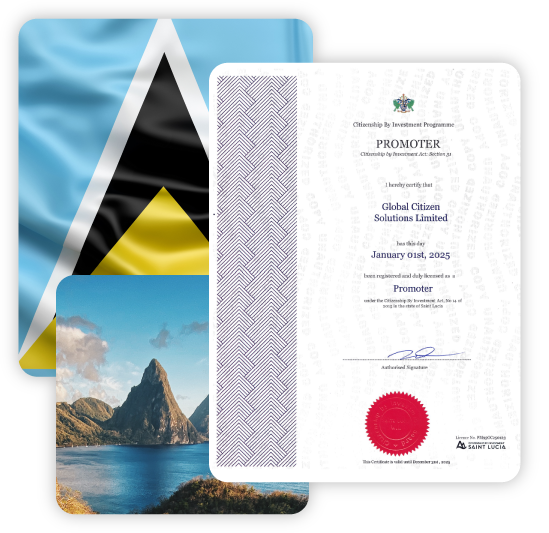Welcome to the world of St Lucia taxes! As a responsible citizen or a curious visitor to the breathtaking island nation of St Lucia, understanding its tax system is crucial. St Lucia, located in the Eastern Caribbean, offers a favorable business environment, stunning natural beauty, and vibrant culture. Like any other country, St Lucia relies on taxes to fund public services and infrastructure development and maintain its economic stability.
This guide will explore the key aspects of St Lucia’s tax system, including how to become a tax resident, the benefits of tax residency in St Lucia, and more. Whether you are a business owner, an employee, or an individual interested in the tax structure of St Lucia, this guide aims to provide you with valuable insights into the country’s tax landscape.
Welcome to St Lucia

The Pitons – Gros Piton and Petit Piton – are a World Heritage Site that continues to blow visitors away with its majesty. Another popular attraction is the Sulphur Springs in Soufriere, the only drive-in volcano in the Caribbean. Here, visitors can enjoy a dip in the mud baths and benefit from their many minerals.
The island also boasts a number of stunning sandy beaches, such as Marigot Bay and Anse Chastanet Beach, that range from secluded white sand coves to rugged stretches of golden or black volcanic sand.
Whether you seek adventure in the outdoors, relaxation on sun-kissed shores, or a glimpse into the island’s vibrant traditions, St Lucia offers an unforgettable experience for every traveler. It also offers a number of attractive tax benefits to both individuals and companies, which is why many consider it a tax haven.
Taxes for Individuals and Businesses
When it comes to St Lucia, the rules are pretty straightforward. Citizens are exempt from capital gains, dividends, and inheritance taxes, while legal entities are exempt from paying taxes on capital gains, dividends, and sometimes value-added tax (VAT).
To be considered a tax resident of St Lucia, an individual must spend a minimum of 183 days in the country each year. In order for a company to be considered a tax resident, it must be registered in St Lucia’s jurisdiction or managed through permanent missions. Tax residents can benefit from some reduced tax rates.
If you do not meet these requirements, you will not be considered a tax resident in St Lucia and will have to pay income tax on any income earned on the island. The Inland Revenue Department (IRD) is the government agency responsible for collecting Caribbean taxes and enforcing tax laws.
Taxes for Individuals
There are four main taxes paid by individuals in St Lucia, namely personal income tax, interest, social contributions, and tax on royalties. On the flip side, individuals do not pay taxes on capital gains or inheritance in the country.
In St Lucia, income tax is levied on the following:
- Business income
- Interest
- Labor activity
- Rent
- Royalty
Furthermore, taxation in the country is progressive, meaning individuals with more wealth pay higher tax rates. For both tax residents and non-residents, income up to EC$18,400 is not taxed, and amounts above this are taxed at fixed rates.
Income tax rates on annual income in St Lucia (EC$)
Income amount | Income tax rate |
Amounts up to $18,400 | 0 percent |
$18,401 — $28,400 | 10 percent |
$28,401 — $38,400 | 15 percent |
$38,401 — $48,400 | 20 percent |
$48,401 and above | 30 percent |
Social contributions
For both residents and non-residents of St Lucia, social contributions are five percent of your monthly income. Your social contributions are paid on your behalf by your employer to the National Insurance Corporation. The NIC then distributes them to disability allowances, pensions, and sickness benefits.
Tax rate on interest and royalties
The tax rate you pay on interest and royalties will depend on your status as a resident. Residents of St Lucia or the Caribbean Community (CARICOM – the trade and economic union of the Caribbean countries that is made up of 15 countries) pay a reduced rate in comparison to non-residents.
Type of tax | For residents of St Lucia | For residents of CARICOM | For non-residents |
Tax on interest | 10 percent | 15 percent | 25 percent |
Tax on royalties | 10 percent | 15 percent | 25 percent |
How to Become a Tax Resident of St Lucia
As mentioned above, a foreigner is considered a tax resident in St Lucia if they spend 183 or more days in the country each year. In order to spend this amount of time in the country, you will need a temporary or permanent residence permit or St Lucia citizenship.
Ultimately, being a citizen of St Lucia provides you with the most benefits by optimizing both taxes and travel (having a St Lucian passport enables travel to 151 St Lucia visa free countries, including the Schengen zone, the UK, Singapore, and Hong Kong. Global Citizen Solutions ranks St Lucia 75th on the Global Passport Index based on factors like quality of life, enhanced mobility, and economic opportunities.
The fastest route to becoming a citizen of St Lucia is through the country’s citizenship by investment program, whereby you can invest in St Lucia real estate or a business, buy government bonds, or make a non-refundable contribution to a government fund.

To acquiring citizenship by real estate investment in St Lucia, a minimum investment amount of $300,000 is required. After five years, the investment property can be sold, and the investment returned. In addition to this, the investor must pay a state fee of at least $30,000.
Business investment
St Lucia business investments must be made into a government-approved project. As an individual, you will need to make a minimum investment of $3.5 million. If you plan on making a joint investment, the minimum amount required is $6 million, and each applicant must contribute a minimum of $250,000.
Buying government bonds
For this option, you must invest in a government bond that must be registered in your name and maintained for five years. The minimum investment amount required is $300,000.
Non-refundable contribution
For this route, you must make an economic contribution to the National Economic Fund, a special fund established by St Lucia’s government and used to fund government-approved projects. For single applicants, the minimum investment amount is $240,000.
It takes between three and six months to obtain a St Lucian passport under the St Lucia citizenship by investment program. Following your investment, you must register in the country’s taxpayer database and receive your Tax number. You must then request a tax code to be issued to you by the Revenue Service, which will allow you to file your tax returns.
Filing Tax Returns
Individuals
You must complete the TD4 or TD5 form, which you can obtain from your employer. You must collect receipts that confirm your expenses in order to receive a tax deduction. You can submit your documents and file an income tax return online using the nation’s digital platform for online tax services. The deadline to file your tax returns is 31 March.
Legal entities
You must complete the TD4, TD5, TD6, and contractor forms and create a list of your company’s employees. You must then submit your documents in a sealed envelope to the tax office by 31 January. Late submissions will be fined for each month that submissions are delayed.
Property Taxes
St Luca real estate purchases are subject to the following fees:
Property transfer tax
Buyers (both individuals and companies) pay a two percent transfer tax.
Stamp duty
Both buyers and sellers pay stamp duty. Buyers pay a two percent stamp duty, while the seller’s stamp duty rate will depend on their residency status. The value of the real estate will define the rate paid by tax residents, while non-residents pay a ten percent rate.
Tax rates for sellers who are St Lucian residents
Real estate value (EC$) | Rate |
$50,000-$75,000 | 2.5 percent |
$75,001-$150,000 | 3.5 percent |
$150,001 and above | 5 percent |
Annual property tax
For residential property, the annual residential property tax rate is 0.25 percent. For commercial property, the tax rate is 0.4 percent. This rate is the same for companies and individuals, whether you are a resident or not.
Taxes for Legal Entities

VAT
Companies that have a sales turnover greater than EC$400,000 per year must pay value-added tax (VAT) at the standard rate of 12.5 percent. VAT exemptions apply to educational, financial, insurance, medical and transport services, rental housing, fuel, water, electricity, goods for export, and goods for sale in duty-free shops.
Tax on interest and royalties
Resident companies pay tax on interest and royalties at a rate of ten percent. Resident companies of CARICOM pay a rate of 15 percent, while non-resident companies pay a rate of 25 percent.
Excise tax
Excise tax is levied on four main categories of goods manufactured or imported into Saint Lucia: Liquor, fuel, beer, and cigarettes. Most of these goods are taxed at a specific rate. Imported goods may be subject to customs duties.
International Business Companies
In accordance with the International Business Companies (IBCs) Act, the St Lucia IBC tax is a flat rate of 30 percent. IBCs are exempt from exchange controls, and stamp duty on the transfer of any property, assets, shares, debt obligation, or other securities. Withholding tax is not levied on the remittance of dividends and distributions, royalties, interest, management fees, or fees or other income paid by IBCs to individuals outside Saint Lucia. Supplies to an IBC are considered an export and a zero percent VAT rate is applied.

Double Taxation Agreements between St Lucia and Other Countries
As a member of the Caribbean Community (CARICOM), St Lucia has double taxation agreements with the following countries:
- Antigua and Barbuda
- Barbados
- Belize
- Dominica
- Grenada
- Guyana
- Jamaica
- Montserrat
- St Kitts and Nevis
- St Vincent and the Grenadines
- Trinidad and Tobago
Benefits of St Lucia Tax Residency
There are a number of benefits to being a tax resident in St Lucia:
- Individuals do not pay income tax on yearly earnings lower than EC$18,400.
- Individuals pay tax on interest and royalties at 10 percent (by comparison, non-residents pay 15-25 percent).
- Companies are VAT-exempt on yearly sales turnover up to EC$400,000.
- Companies pay tax on interest and royalties at 10 percent (non-residents pay 15-25 percent).
- Residents selling real estate pay a five percent stamp duty (non-resident sellers pay ten percent).
In conclusion, St Lucia not only captivates with its natural beauty and vibrant culture but also offers attractive tax benefits for those considering establishing residency or investing in the island. With its low personal and corporate tax rates, no St Lucia capital gains tax, and various incentives for international businesses, St Lucia has positioned itself as a favorable destination for individuals and companies seeking to optimize their financial affairs.
The advantages of St Lucia taxes, coupled with its stable economy and political environment, make it an appealing choice for those looking to grow their wealth and enjoy a high standard of living in a tropical paradise. Whether you’re an entrepreneur, investor, or retiree, the benefits of taxes in St Lucia add an extra allure to an already enticing destination. So, take advantage of the opportunities that St Lucia presents and embark on a path of financial prosperity in this Caribbean haven.
Why use Global Citizen Solutions?
Global Citizen Solutions is a multidisciplinary firm offering bespoke residence and citizenship solutions in Europe and the Caribbean. In a world where the economy and politics are unpredictable, having a second citizenship opens up opportunities and creates flexibility for you and your family.
So, why work with Global Citizen Solutions to obtain St Lucia citizenship?
- Authorized International Marketing Agent. Global Citizen Solutions have official certification by the Government of St Lucia to promote and market their Citizenship by Investment program. You can find a copy of our certificate by clicking the image on the right
- Global approach by local experts. We are corporate members of the Investment Migration Council, with local expertise in all five Caribbean CBI programs.
- 100 percent approval rate. We have never had a case rejected and will offer you an initial, free-of-charge, due diligence assessment before signing any contract.
- Independent service and full transparency. We will present to you all the investment options available, and all expenses will be discussed in advance, with no hidden fees.
- An all-encompassing solution. A multidisciplinary team of immigration lawyers, investment specialists, and tax experts will take into consideration all your and your family's mobility, tax, and lifestyle needs.
- Confidential service and secure data management. All private data is stored within a GDPR-compliant database on a secure SSL-encrypted server.

Frequently Asked Questions about St Lucia Taxes
What taxes do you pay in Saint Lucia?
In Saint Lucia, you will need to pay personal income tax (the income tax rate is progressive based on the income amount), VAT, stamp duty, property tax, and tax on interest and royalties. Companies also pay corporate income tax and excise tax. The tax rate you pay will vary depending on whether you are a tax resident in St Lucia or not. For example, companies that are tax residents pay a lower tax rate on interest and royalties. You don’t pay taxes on capital gains, dividends, or inheritance.
Is St Lucia a tax haven?
If you’re considering Antigua vs St Lucia citizenship, for example, Antigua is the better option as it is a true tax haven, whereas St Lucia is not.
Do you pay property taxes in St Lucia?
Yes, you will need to pay property tax in St Lucia. For residential property tax, the rate is 0.25 percent of the Open Market Value. For commercial property tax, the rate is 0.4 percent of the Open Market Value.
Is there VAT in St Lucia?
Yes, there is value-added tax (VAT) in St Lucia. The standard St Lucia VAT rate is 12.5 percent.
What is the income tax rate in St Lucia?
The income tax rate in St Lucia works on a progressive scale from 15 to 30 percent. St Lucia tax residents do not pay income tax on income under EC $18,400 per year. Interest and royalty taxes are ten percent for tax residents, while non-residents pay a 15 to 25 tax. Legal entities are VAT exempt if their annual sales turnover does not exceed EC $400,000.
Is there a 2.5% tax in St Lucia?
Saint Lucia levies a 2.5 percent Health and Citizen Security Levy (HCSL) on the importation of goods, the provision of certain services by a VAT-registered taxpayer in Saint Lucia, and the provision of certain services by a non-resident to a VAT-registered taxpayer in Saint Lucia.
What is contract tax in St Lucia?
St Lucia contract tax is a personal income tax liable for a contractor who supplies independent personal services. Chargeable income is payments to an independent contractor directly or indirectly through a St Lucia financial institution. Those working in the following professions are not subject to contractor tax:
- Accountants, financial auditors, and tax consultants
- Attorneys
- Business and management consultants
- Doctors, dentists, pharmacists, and nurses
- Engineers
- Funeral undertaking services



